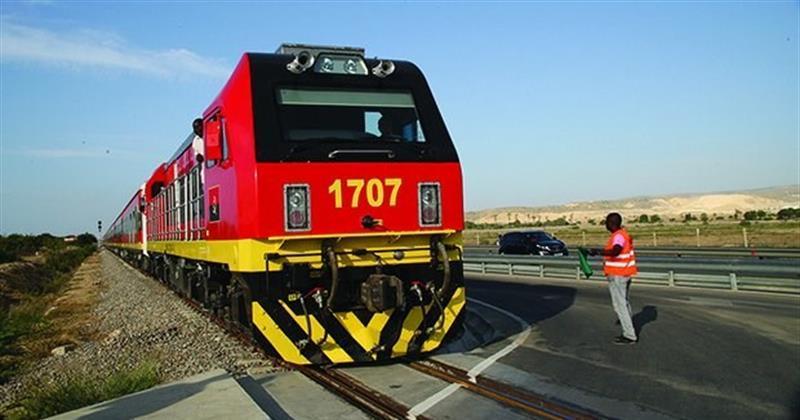Africa-Press – Angola. Diplomats from several countries and international organizations accredited to Angola, on Wednesday in Huambo considered the Lobito Corridor a strategic instrument for the diversification of the national economy and unblocking agricultural potential.
Speaking to the press during a train journey between the city of Huambo and the municipality of Longonjo, a 64-kilometer route, they highlighted that the project is part of the sustainable development strategy, not only of Angola, but also of the Southern Region of the African continent and of international partners.
The European Union (EU) ambassador, Ms Rosário Bento Pais, said that the Lobito Corridor is currently the most important in Africa for development, not as a simple transport route, but as an economic route, in which all other policies of the agricultural value chains, such as digitalization and energy, will be developed.
He said that the project is part of the sustainability strategy for investment in transport, energy, digitalisation, health and education of the organisation she represents, adding that the European Union is implementing the 2024-2027 budget and investing in the Lobito Corridor, together with the Angolan Government, whose priorities have been given in three main axes namely, diversification of the economy, creation of jobs for young people and the interest of the local population along the route.
She added that a large percentage of the organization’s support to Angola between 2021-2027, estimated at 403 million euros for Angola, 147 million of which is earmarked for investment in the Lobito Corridor, starting with training in transport, infrastructure, value chains, digitalization, energy and benefits for the population.
The European diplomat said the investment protects the parks and all the biodiversity along the corridor, at a time when the EU will be focused on the institutional strengthening needed to attract more private investment to Angola.
The Resident Coordinator of the United Nations System in Angola, Ms Zahira Virani, said she was very happy and pleased to be part of the high-level delegation of ambassadors and business people who are investing in infrastructure in the Lobito Corridor, a catalyst for development.
She said the fact that 40% of the Angolan population live alongside the Lobito Corridor requires, above all, a focus on women and youth, for the sustainable development of value chains in agriculture, infrastructure and job creation.
The Portuguese ambassador, Francisco Alegre Duarte, stated that it is a strategic project for Angola, for the Southern Region of the African continent and for the partners involved, who, through an initiative of the Embassy of the United States of America (USA), are joining forces so that it will no longer be simply a transport for miners, but an instrument to combat threats, diversify the economy, export agricultural products, promote tourism and improve the well-being of communities.
The diplomat from the United Kingdom (UK), Bharat Joshi, said that his country is very actively involved in the Angolan economy, as well as in the infrastructure, with the construction of hospitals, revealing that the largest programme in Africa and in Angola, in particular, is budgeted at around 3 million pounds, as is the case of the exploration of rare earth elements in Longonjo, on the Lobito Corridor route.
The Norwegian ambassador, Bjørnar Dahl Hotvedt, said that although his country has not yet invested in this strategic project of the Angolan government, it is taking advantage of it to identify the agricultural potential in the interior of Angola, for a possible Norwegian investment, with only 3% of arable land.
The South Korean Ambassador Kwang-Jin Choi, said that his country also considered the Lobito Corridor a strategic instrument, which has deserved the attention of foreign governments and companies from various parts of the world.
The diplomat stressed that he was very pleased to be there and to see first-hand the importance of the Lobito Corridor as the backbone of what will be Angola’s economy in the future, as it is a project that significantly affects the idea of establishing a regional distribution centre for products produced in the region.
In turn, German ambassador, Stefan Traumann, said that this is a very important route, at a time when his country is investing in the construction of the Bioveterinary Centre and the Animal Vaccine Factory in this province, which is valued at 125 million euros, to serve Southern Africa.
For Sweden, which will celebrate 50 years of diplomatic relations with Angola in 2026, this is seen as a fundamental project for sustainable local and regional development.
In turn, the Counsellor- Minister of the Dutch Embassy, Paul Ederer, said that the Lobito Corridor will unlock Angola’s agricultural potential, with an impact on the export of avocados to the Netherlands, at a time when they are investing in the construction of the Logistics Platform in the municipality of Caála.
The delegation of diplomats, headed by the Chargé d’Affaires of the Embassy of the United States of America in Angola and São Tomé, James Story, includes the ambassadors of Germany, Belgium, Canada, Korea, Spain, Italy, Norway, the United Nations, Portugal, Romania, the United Kingdom, the European Union, Swaziland and the Chargé d’Affaires of the embassies of Spain, the Netherlands, Sweden and Switzerland.
The Lobito Corridor, which is 1,300 kilometres long, begins in the Port of Lobito, bathed by the Atlantic Ocean, and crosses Angola from west to east, passing through the provinces of Benguela, Huambo, Bié, Moxico and Moxico-Leste. It is extended to the mining areas of the province of Katanga in the Democratic Republic of Congo (DRC) and the Copperbelt in Zambia.
The Benguela Railway, which in the province of Huambo, crosses the municipalities of Chinjenje, Ucuma, Longonjo, Caála, Huambo, Chicala-Cholohanga and Cachiungo, has 67 stations from Lobito to Luau, in Moxico-Leste.
For More News And Analysis About Angola Follow Africa-Press






